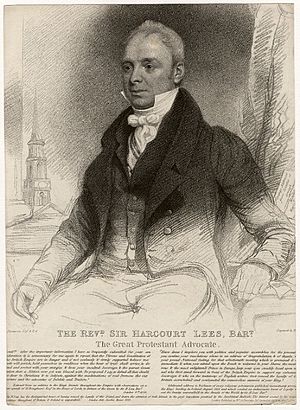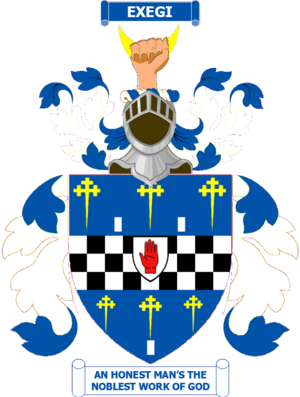Harcourt Lees facts for kids
Sir Harcourt Lees (born November 29, 1776 – died March 7, 1852) was an Irish clergyman and a writer of political pamphlets. He lived near Dublin in a place called Blackrock. He was known for writing strong opinions that supported the idea of Protestant Ascendancy in Ireland. This meant he believed Protestants should have the most power and influence. He often wrote very direct criticisms of Roman Catholicism.
About His Life
Harcourt Lees was the oldest son of Sir John Lees. His father was made a Baronet in 1804, which is a special title of honor. Harcourt went to Trinity College in Cambridge, England, where he earned his first degree in 1799 and a master's degree in 1802.
After college, Sir Harcourt Lees became a clergyman, which means he took "holy orders" and became a priest in the Church of Ireland. He worked in a church in a place called Killanny, which is partly in County Monaghan and partly in County Louth. He also held other church positions in Cashel and Clogher for a few years before he resigned them. He passed away in Blackrock, near Dublin, in 1852.
When his father died in 1811, Harcourt Lees became the second Baronet. He married Sophia Lyster around 1812. They had four sons and four daughters. One of his sons, William Nassau Lees, became a well-known writer and soldier. After Sir Harcourt Lees died, his oldest son, Sir John Lees, became the third Baronet.
His Writings
Sir Harcourt Lees wrote many pamphlets. These were like short books or essays that shared his strong opinions, mostly supporting the idea of Protestant power in Ireland. His writings were known for being very lively and direct.
He wrote about many topics, often criticizing those who supported more freedom for Catholics. Some of his pamphlets included:
- The Antidote: This pamphlet was written in 1819 and was about civil and religious freedom.
- The Mystery: Published in 1820, this was another strong response to his critics.
- An Address to the King’s Friends: In 1820, he wrote this to people who supported the King, talking about the state of Great Britain.
- A Cursory View of the Present State of Ireland: This pamphlet from 1821 shared his thoughts on how Ireland was doing at the time.
His writings show how strongly he felt about the political and religious issues of his time in Ireland.
Family Symbol
 | James Van Der Zee |
 | Alma Thomas |
 | Ellis Wilson |
 | Margaret Taylor-Burroughs |



